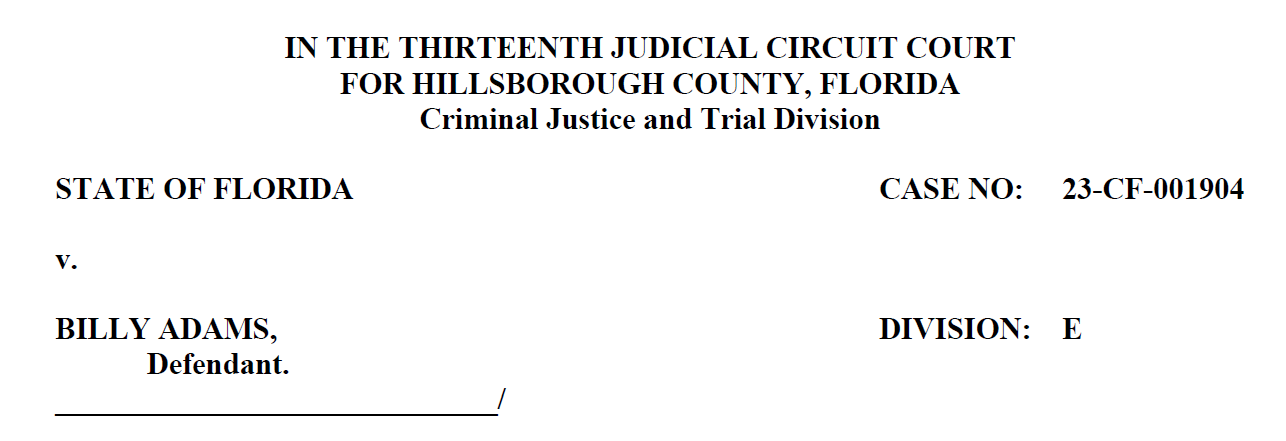Hillsborough County judge rules 2023 statute cannot apply to Billy Adams' trial
In an Order issued yesterday, a circuit court judge in Hillsborough County ruled that Florida’s 2023 capital sentencing statute cannot apply to Billy Adams’ upcoming trial.
In an Order issued yesterday, a circuit court judge in Hillsborough County ruled that Florida’s 2023 capital sentencing statute—which went into effect on April 2023 and requires a jury recommendation of only 8-4 for death (the “Amendment”)—cannot apply to Billy Adams’ case in which he is charged with crimes that occurred in January 2023.
The Order came after the court held a hearing on Adams’ Motion to Preclude Application of the Most Recent Amendments to F.S. 921.141, as Such Application Would Violate F.S. 775.022 and related briefing on January 30, 2024. In the Motion, Adams, through his attorneys, argued that section 775.022, Florida Statutes, requires that the Amendment “operate only prospectively and, therefore, prohibits the application” of the Amendment to the crimes at issue in his case, which are alleged to have occurred in January 2023.
Section 775.022 provides in pertinent part:
(2) As used in this section, the term “criminal statute” means a statute, whether substantive or procedural, dealing in any way with a crime or its punishment, defining a crime or a defense to a crime, or providing for the punishment of a crime.
(3) Except as expressly provided in an act of the Legislature or as provided in subsections (4) and (5), the reenactment or amendment of a criminal statute operates prospectively and does not affect or abate any of the following:
(a) The prior operation of the statute or a prosecution or enforcement thereunder.
(b) A violation of the statute based on any act or omission occurring before the effective date of the act.
The court found (and the State conceded in its filings) that the Amendment “is a criminal statute within the meaning of Section 775.022(2),” as it clearly “deals with the ‘punishment’ of any crime that makes a defendant eligible for the death penalty.” Therefore, the Court concluded that the Amendment “falls within the purview of Section 775.022” and turned to section 775.022(3).
In Adams’ case, prosecution had already begun when Gov. DeSantis enacted the Amendment on April 20, 2023. Adams was arrested on February 8, 2023, and indicted on February 23. The State filed its Notice of Intent to Seek the Death Penalty on March 24. Therefore, the Court found that section 775.022(3) prohibits the Amendment from affecting the prosecution in Adams’ case.
The full Order can be downloaded here.
Prior TFDP Coverage of Adams’ Case
A Note on the Ruling
This is the first trial court in the State to make this ruling on this basis. If you have been following for the past year since the Amendment went into effect, you’ll recall that trial courts across the State have weighed in on the applicability of the new statute on different grounds in cases in different procedural postures.
In cases awaiting Hurst resentencing, a few trial courts held that the Amendment could not apply. In Volusia County, a trial court held the Amendment did not apply to Hunter and Victorino’s resentencing because jury selection was underway when the Amendment went into effect. (More here.) However, the Fifth DCA ultimately reversed that ruling, and the Florida Supreme Court denied the appeal.
In addition, trial courts in Polk and Hillsborough Counties have held that applying the new statute to cases like Adams’ where the crime occurred between Hurst and the Amendment would violate the ex post facto clause. The Polk County rulings were appealed to the Sixth DCA and remain pending.1 As TFDP previously covered, the trial court in Adams’ case previously denied Adams’ motion for relief on this ground because of the Fifth DCA’s decision in Victorino (discussed above).




